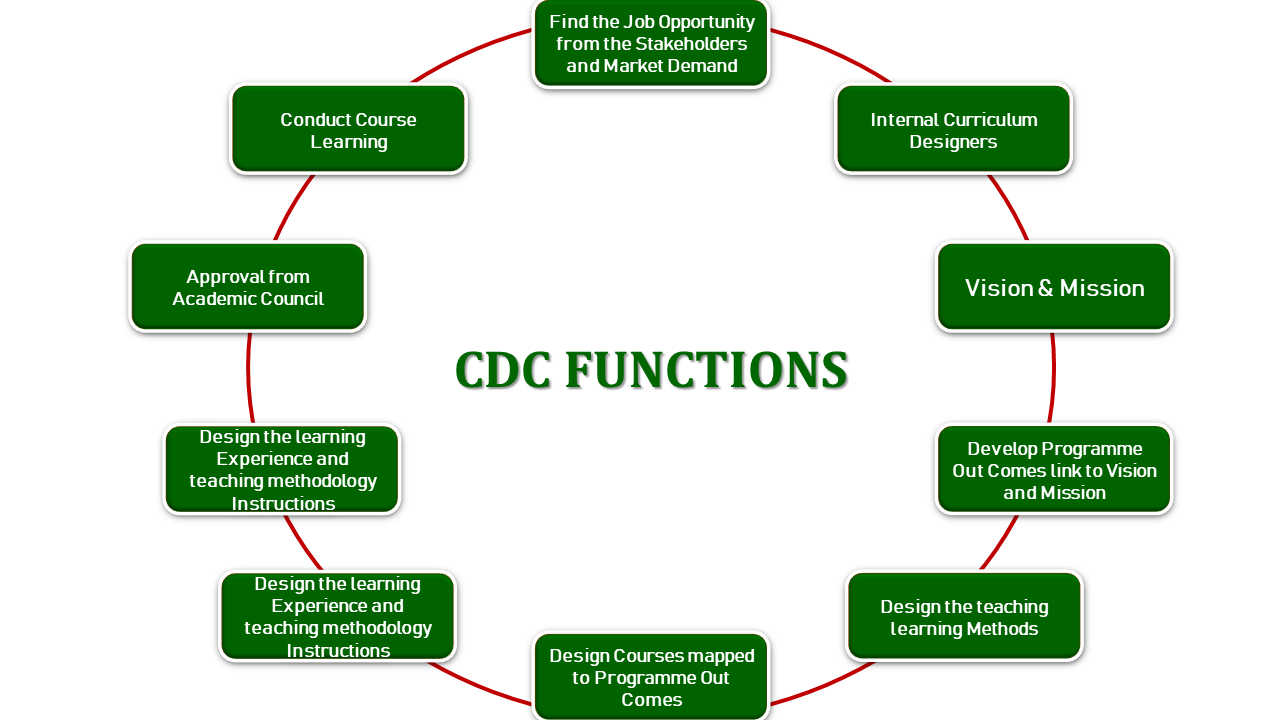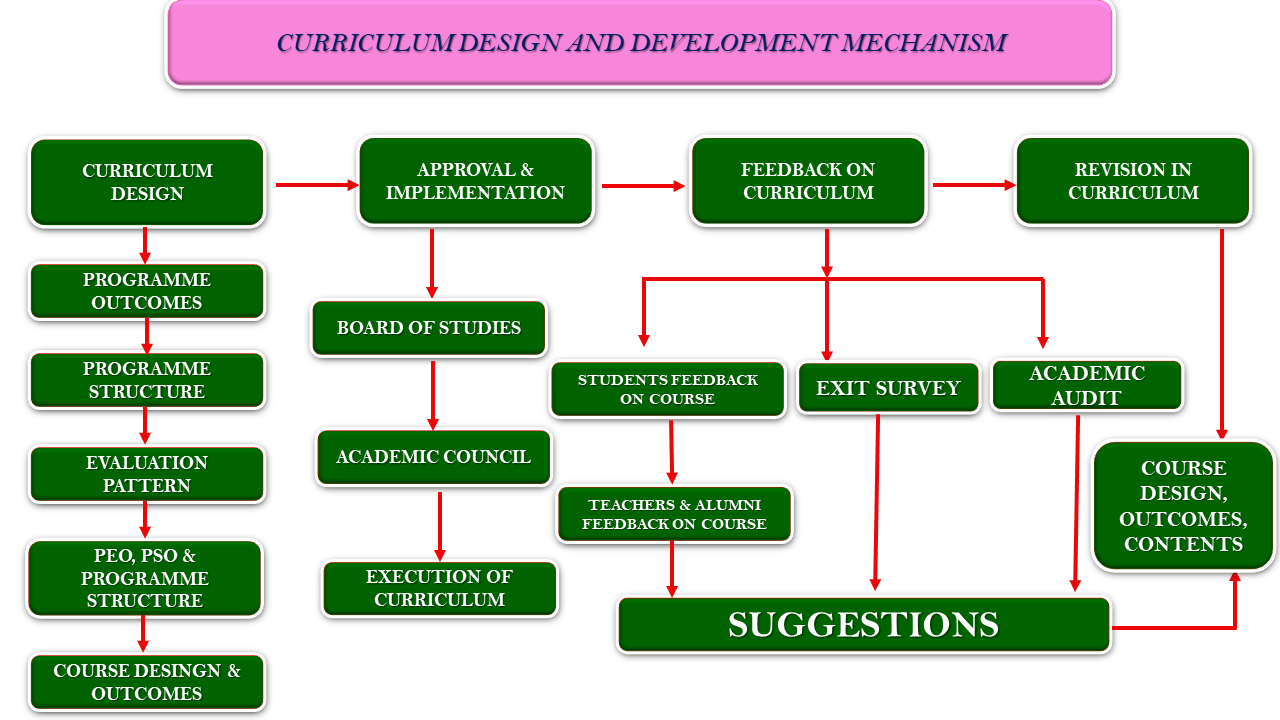- kmgcollege@kmgcollege.edu.in
- +91 4171 227306
- Online Application

- Online tuition fees
- Stakeholders Feedback
- Alumni
- Student Login



About CDC:
The KMG College of Arts and Science being an autonomy of Higher Education from the academic year of 2024 – 2025, we initiated Curriculum Development Cell (CDC) for the regular monitoring of the curriculum and syllabus. CDC is essential for an autonomous college to design and implementation of curriculum. It is the key factor for the formal education process and take initiatives in restructuring the curriculum based on the UGC norms and TANSCHE guidelines. It also accomplishing the vision of the institution into the learning community with multidisciplinary and multitasking skills. CDC functioning as a backbone in the continuous process of designing the curriculum and developing the course to provide an updated education to the students.
The Curriculum Development Cell is functioning effectively in K.M.G College of Arts and Science (Autonomous) under the guidance of the Principal as the Chairperson. In the Curriculum Development cell, in addition to chairperson four coordinators and 15 members representing the disciplines of arts and science, commerce and management.
Any reputation educational Institutions measure based on the quality of the graduating students and their output to the society. Therefore, the quality of students is predominately depended the curriculum and learning methodology of an institution. Hence curriculum has vital role in college reputation, which should monitor by a separate cell, so that there is a need for Curriculum Development Cell (CDC). The primary function of CDC is to prepare curriculum framework and design. The structure curriculum should reach the recent advance development in industry and educational scenario.
The manual of Curriculum Development Cell is a structured document that delineates the vision and mission of the institution besides with the teaching learning experiences and assessments of educational programme. In fact, it is a guide to curriculum development and assist in planning and implementing high quality instructional programme. Curriculum Development Cell is playing a vital role in the curriculum designing that involves the formulation of general course scheme and scheme of examinations for all UG, PG and Diploma courses along with the operational guidelines and also in the formulation of teaching and evaluation strategies.
Vision of the Club:
To design and develop academic programmes to provide quality education through appropriate teaching-learning method and educate the rural students to stand their own independent and responsible citizens.
Mission of the Club:
Objectives of the Club:
QUALITY POLICY:
ROLES AND RESPONSIBILITIES:
CDC FUNCTIONS:
Curriculum Development Cell have few primary functions, such as develop institution goals which reflect the vision and mission, based on the goals form programme outcomes and programme specific outcomes, with the reflection of programme outcome design the course and course outcomes. These courses should get approval in concern board of studies followed by academic council. Finally, the course implemented in the curriculum and collect the feedback from different stakeholders. Based on stakeholders feedbacks, recent advanced development and market demand reconstruct the curriculum with necessary modifications.

Composition:
The CDC shall consist of the following members:
| # | Name of the Staff | Designation | Position |
|---|---|---|---|
| 1 | Prof.Dr.C.Dhandapani | Principal | Chairperson |
| 2 | Dr. S. Praveen kumar | HOD - Chemistry | Coordinator |
| 3 | Dr. D. Manikandan | HOD – Microbiology & Dean Academics | Member |
| 4 | Dr. R. Manikandan | Controller of Examination | Member |
| 5 | Dr. J. Jaya Kumar | HOD - Tamil | Member |
| 6 | Dr. P. Bhavani | HOD - English | Member |
| 7 | Mrs. P. Anjugam | HOD – Computer Application | Member |
| 8 | Dr. K. Gomathy | HOD - Commerce | Member |
| 9 | Dr. M. Ashtalakshmi | HOD – Commerce CA | Member |
| 10 | Dr. P. Daniel Sundarraj | HOD – Computer Science | Member |
| 11 | Dr. J. Thirumagal | HOD - Biochemistry | Member |
| 12 | Dr. N. Raji | HOD - Mathematics | Member |
| 13 | Mr. N. S. Rajanandan | HOD - Artificial Intelligence | Member |
| 14 | Mrs. V.S. Vinitha Janani | HOD – Data Science | Member |
| 15 | Dr. P. Shankar | HOD – Business Administration | Member |
| 16 | Mrs. M. Mohana Priya | HOD - Physics | Member |
| 17 | Mr. B.Balaji | IQAC Coordinator | Member |
| 18 | Mr. R. M. Balamurugan | IQAC Member | Member |
| 19 | Dr. C. Venkatesan | Assist. Professor - Biochemistry | Member |
| 20 | Mr. B. Vinoth | Assistant Professor - Mathematics | Member |
CURRICULUM DESIGN AND APPROVAL PROCESS:
CDC design the programme outcomes and curriculum with the reflection of institution vision and mission. The curriculum passed in the board of studies after the approval it has been subjected in academic council for approval to implementation. CDC collect the feedbacks from different stakeholders based on the feedback, exit survey and academic audit the curriculum restructured to fulfill the requirement of job opportunities in the global environment.
